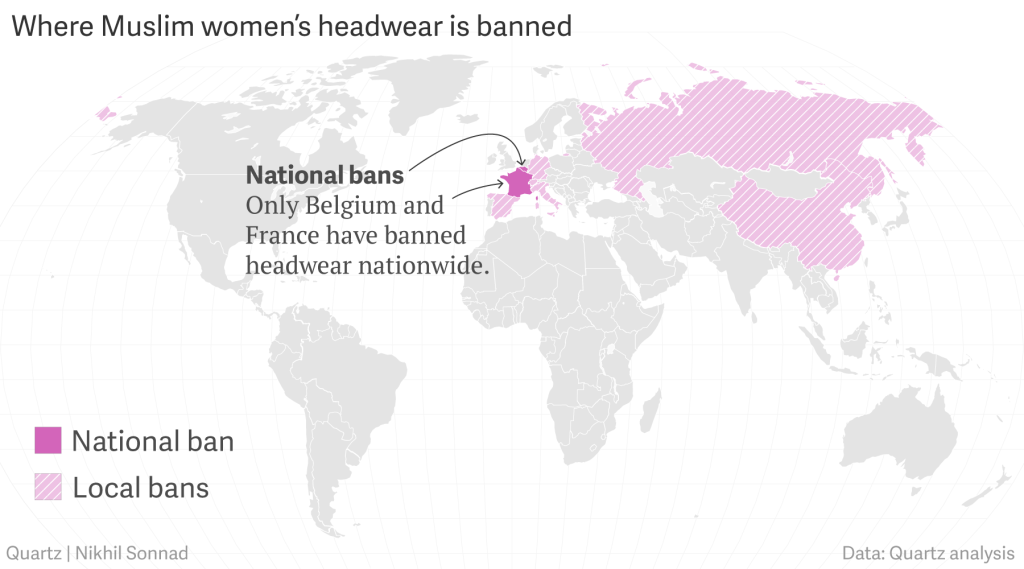5 countries with the strictest dress codes

Image: REUTERS/Nacho Doce
Stay up to date:
Gender Inequality
All the world’s a fashion critic – especially if you’re a woman. For centuries, and all around the globe, strict laws have governed what people wear. From caliphates to communist republics and even in the democratic West, a moral war is being waged on our wardrobes, one that rages on today.
Take Gambia, newly declared an Islamic republic, where female government workers have just been urged to “use head ties and neatly wrap their hair”. These hapless civil servants may have been “urged”, but for citizens of some countries, straying from the prescribed dress code is altogether more serious, carrying a prison sentence, fine or even public flogging.
So, in the spirit of sartorial solidarity, we take a look at five nations where personal style and political style are one and the same.
North Korea: long hair for men, trousers for women
“Let’s trim our hair in accordance with the socialist lifestyle” – so ran the title of a five-part series on North Korean state TV, exhorting citizens to choose one of several officially sanctioned haircuts. Hair should be kept 1-5cm in length and be trimmed every 15 days. Meanwhile, women caught wearing trousers can be punished with forced labour and fines, although these rules are beginning to relax a little, according to reports.
Sudan: trousers for women, make-up for men
North Korea is not the only country where men wear the trousers: in Sudan in 2014, there was outrage as nine women faced 40 lashes for the crime of wearing western-style slacks. Harsh interpretations of sharia law mean thousands of Sudanese women are arrested each year for “public order” offences such as wearing short skirts and dancing with men. The offences aren’t entirely gender specific: in 2010 seven men, models at a fashion show, were convicted of indecency and fined for wearing make-up.
Saudi Arabia: bare skin for women, cross-dressing for men
It doesn’t matter whether you’re local or foreign – if you’re a woman and you’re in Saudi Arabia, flashing an inch of flesh is a criminal act. Muslim women are required to wear a niqab and long black cloak called an abaya, while foreign women can get away with a long coat and bare head, if they dare. But clothing restrictions don’t only apply to women: in 2009, the Saudi government arrested 67 men at a private party in Riyadh. The offence: cross-dressing and “behaving like women.”
France: niqabs and burqas
France introduced a “burqa ban” in 2010, a law that made it illegal for people to cover their faces in public. Aimed at everything from motorcycle helmets to hoods and balaclavas, the law has been widely criticized as discriminatory towards Muslim women, who wear burqas and niqabs for religious reasons. In 2014, a case brought against the ruling was rejected by the European Court of Human Rights, on grounds that uncovered faces encourage citizens to “live together”.
Uganda: miniskirts
It’s a bad time, too, for women in socially conservative Uganda, who face arrest if they’re seen wearing skirts or shorts “above the knee”, following new legislation that bans “indecent dressing”. Part of a new anti-pornography bill, the law has led to several incidents of women being harassed and assaulted in the streets. Following mass protests in the streets of Kampala, the prime minister has announced he will review the law.
Have you read?
What are your basic freedoms?
10 things to know about human rights
Saudi Arabia elects its first female politicians
Author: Anna Bruce-Lockhart is an editor at the World Economic Forum
Image: Gisele Marie, a Muslim woman and professional heavy metal musician, walks past a poster after a rehearsal at her house, in Sao Paulo September 15, 2015. REUTERS/Nacho Doce
Don't miss any update on this topic
Create a free account and access your personalized content collection with our latest publications and analyses.
License and Republishing
World Economic Forum articles may be republished in accordance with the Creative Commons Attribution-NonCommercial-NoDerivatives 4.0 International Public License, and in accordance with our Terms of Use.
The views expressed in this article are those of the author alone and not the World Economic Forum.
Forum Stories newsletter
Bringing you weekly curated insights and analysis on the global issues that matter.
More on Equity, Diversity and InclusionSee all
Silja Baller
May 15, 2025
Tea Trumbic and Dhivya O’Connor
May 13, 2025
Harrison Lung and Hatem Bamatraf
May 7, 2025
Zainab Azizi
April 9, 2025





